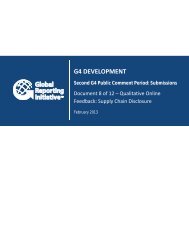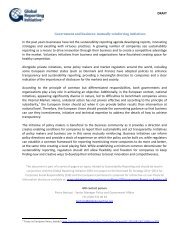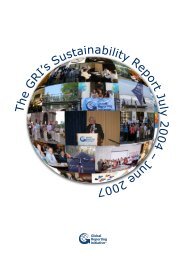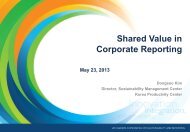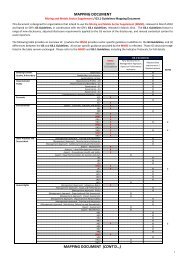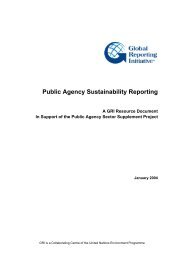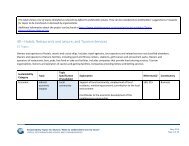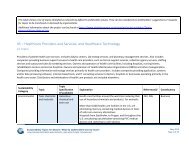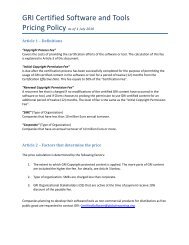CARROTS AND STICKS – PROMOTING ... - Global Reporting Initiative
CARROTS AND STICKS – PROMOTING ... - Global Reporting Initiative
CARROTS AND STICKS – PROMOTING ... - Global Reporting Initiative
You also want an ePaper? Increase the reach of your titles
YUMPU automatically turns print PDFs into web optimized ePapers that Google loves.
82 Carrots and Sticks - Promoting Transparency and Sustainability<br />
reduction of pollution, etc., followed<br />
by social elements like supporting<br />
local NGOs, promoting education in<br />
the local communities, campaigning<br />
against HIV/AIDS, promoting<br />
entrepreneurship in local youth<br />
and women, etc., are the common<br />
disclosure aspects.<br />
Assessment<br />
Companies in India have taken<br />
to disclosing their economic,<br />
environmental and social reports in a<br />
voluntary manner. These companies<br />
have recognised that reporting<br />
practices have led to systematic<br />
measurements and improvements in<br />
an incremental manner. This in turn<br />
has led to good reputation and brand<br />
building amongst various stakeholder<br />
groups including the investors.<br />
From the list of sustainability reports<br />
registered in the GRI website it is<br />
observed that many companies like<br />
ITC, Reliance Industries, Jubilant<br />
Organosys and Dr Reddy’s are the<br />
leading companies with almost 6<strong>–</strong>7<br />
years of experience in sustainability<br />
reporting. However, there are many<br />
companies from other sectors like<br />
engineering and construction, e.g.<br />
L&T, Mahindra & Mahindra of the<br />
auto sector; Infosys and Wipro<br />
Technologies from the ICT sector<br />
that have come up with innovative<br />
approaches to report presentation<br />
and establishing reporting<br />
processes only in the recent past.<br />
It is noteworthy that the five<br />
industrial sectors with the highest<br />
market value are petrochemicals;<br />
manufacturing; infrastructure;<br />
telecommunications; and banking<br />
which are showing a rising trend of<br />
reporting. For example, a move has<br />
been set in motion by the central<br />
regulating Reserve Bank of India<br />
(RBI) which would like major banks<br />
to play a pivotal role in sustainability<br />
issues by sensitising their clients to<br />
the issues related to human rights<br />
and environment.<br />
It is most often understood by the<br />
leading reporters that the purpose<br />
of issuing Sustainability Reports is<br />
to enlarge the scope of conventional<br />
corporate financial reporting and help<br />
companies to ensure transparent<br />
communication and engagement<br />
with their stakeholders in respect<br />
of the company’s sustainability<br />
performance. However, the link<br />
between sustainability report content<br />
and stakeholder dialogues and their<br />
outcomes show few examples of an<br />
established, systematic approach.<br />
Early reporters of the Indian<br />
subcontinent need encouragement<br />
to report fully and regularly using<br />
the principles of materiality and<br />
stakeholder inclusiveness.<br />
In India, the incorporation of<br />
environmental and social costs and<br />
benefits into mainstream financial<br />
reporting is an embryonic field at<br />
present but it is certain to grow. At<br />
present this approach and practice<br />
of considering a full array of metrics<br />
tied directly to business performance<br />
and risk management is yet to take<br />
root. Involvement and commitment<br />
of corporate accountants and<br />
strategy managers in sustainability<br />
management appears to be limited.<br />
Conclusion<br />
The evolutionary course of<br />
sustainability reporting is now taking<br />
shape as more companies move<br />
from informal statements to formal<br />
reporting. It is often expressed<br />
that the standardised framework<br />
of the GRI Guidelines provides<br />
an incremental road map for<br />
widening the scope of disclosure<br />
aspects. However, capacity<br />
building of local institutions that<br />
can further impart knowledge and<br />
expertise to companies to adopt<br />
the standardised framework is an<br />
important issue which needs to be<br />
considered.<br />
It is also pertinent that Indian<br />
companies should adopt and<br />
establish a sound reporting<br />
process for identifying its material<br />
issues and target audience before<br />
embarking on the sustainability<br />
reporting agenda. This will help<br />
them to accrue the benefits of<br />
the reporting practice, ensuring<br />
accountability, transparency,<br />
consistency and comparability to its<br />
readers.<br />
In many cases it is observed that<br />
some of the best sustainability<br />
reporting practices spring from<br />
countries with regulations, listing<br />
requirements and exchangesponsored<br />
indexes. Investors<br />
should also use their leverage with<br />
government and stock exchanges<br />
to promote the practices of<br />
sustainability reporting. Efforts to<br />
promote these changes must be<br />
undertaken in parallel with those to<br />
engage companies individually to<br />
encourage sustainability reporting.<br />
5.6 South Africa<br />
Introduction<br />
In part due to its political history<br />
and transition to democracy in the<br />
1990s, South Africa has played a<br />
prominent role in the sustainability<br />
reporting movement. As a result of<br />
debates about disinvestment from<br />
South Africa under the old Apartheid<br />
dispensation, and driven by initiatives<br />
such as the Sullivan Principles in the<br />
USA, the transparency and disclosure<br />
debate was a lively one in South<br />
Africa from an early stage, even<br />
before the concept of sustainability<br />
reporting became popularised.<br />
“Business is the main driving<br />
force for resource efficiency<br />
in the economy, for technology<br />
deployment and development, for<br />
infrastructure construction and<br />
providing financial services. But<br />
business can fulfill its role only if<br />
the right framework conditions <strong>–</strong><br />
including those for reporting and<br />
disclosure <strong>–</strong> are in place. Valuing<br />
and sustainability reporting must<br />
increasingly become a more<br />
integral part of economic planning<br />
and decision-making by society,<br />
government and business.”<br />
Björn Stigson, President, World Business<br />
Council for Sustainable Development (WBCSD)





